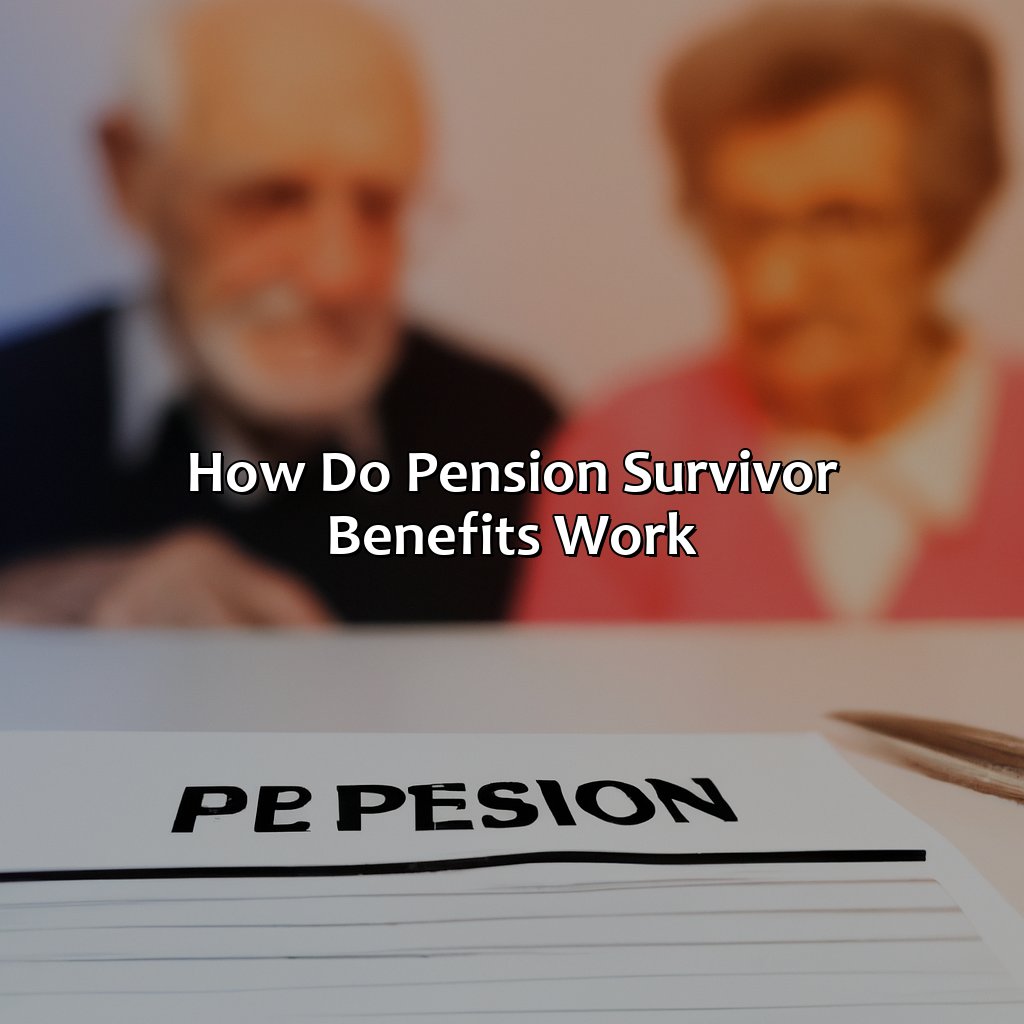How Do Pension Survivor Benefits Work?
Key Takeaway:
- Pension survivor benefits provide a payout to the surviving spouse or beneficiary of a deceased pensioner, ensuring financial support in the event of their death.
- To be eligible for pension survivor benefits, the surviving spouse or beneficiary must satisfy certain criteria, including age and length of marriage in some cases. Documentation may also be required to support the application.
- To maximize pension survivor benefits, it is important to understand the pension rules and payment options available. Making sound financial decisions can also help to ensure long-term financial stability and security.
Are you worried about the financial security of your loved ones after you are gone? Understanding pension survivor benefits can help ensure that they are taken care of. You can learn more here about how these benefits work, and how they can help protect your family.
Understanding Pension Survivor Benefits
Pension Benefits for Survivors: What You Need to Know
Pension benefits are an important source of income for many retirees. However, it’s crucial to understand how they work for survivors. If the policyholder dies, the surviving spouse or designated beneficiary may receive some or all of the same benefits.
The amount of the surviving spouse benefits is typically specified in the pension plan’s terms, which should be reviewed carefully. The survivor benefits may be paid only if the policyholder selected this option at the time of retirement.
It’s important to understand that the amount of the benefits for the surviving spouse is typically lower than what the policyholder received while living. This is because pension plans generally take into account the fact that the survivor benefits may need to be paid out over a longer period of time.
According to the Social Security Administration, more than 11 million people receive survivor benefits from Social Security each year. These benefits are paid to widows, widowers, and other family members of deceased workers who were eligible for Social Security.
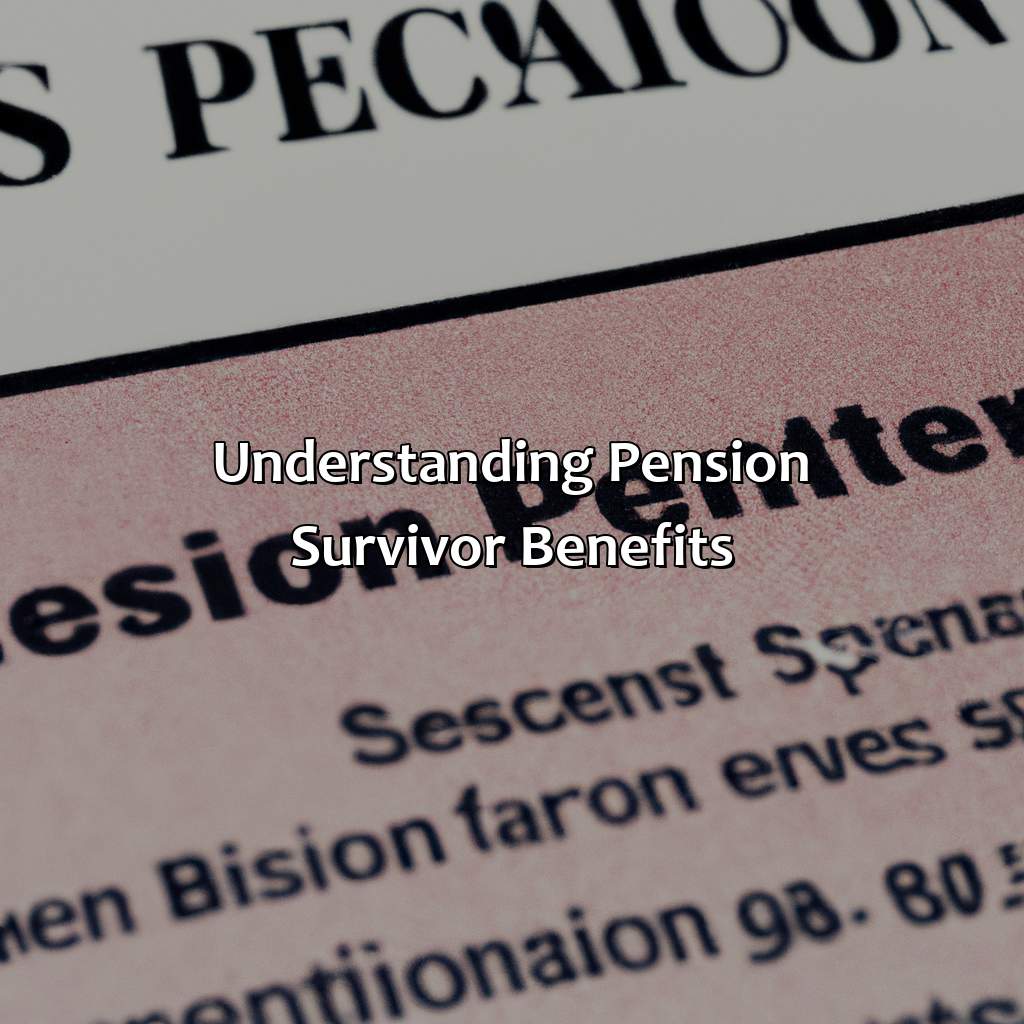
Image credits: retiregenz.com by James Washington
Definition and Eligibility
Pension Survivor Benefits – Requirements and Eligibility
Pension survivor benefits aim to support the remaining spouse, children, or other dependents of an individual who has recently passed. Eligibility for these benefits typically requires understanding of how union pension works and the deceased individual to have worked for a certain number of years and contributed to a pension plan or retirement account. Additionally, the surviving spouse or dependents usually must meet specific criteria, such as being under a certain age or having a disability.
To receive pension survivor benefits, the surviving spouse or dependents must apply through the applicable pension plan or retirement account, providing documentation proving their identity and relationship to the deceased individual. Furthermore, some pension plans may offer multiple options for distributing benefits, such as a lump sum payout or ongoing monthly payments.
It is worth noting that each pension plan or retirement account may have different eligibility requirements and distribution options, and it is essential to review and understand the details of the specific plan to which you or your loved one has contributed.
For example, take the story of Jane, whose husband passed away unexpectedly. While grieving her loss, Jane was left wondering how she would support herself and her two young children. Fortunately, her husband had been enrolled in a pension plan that offered survivor benefits, and after reviewing the plan’s eligibility requirements, Jane was able to apply and start receiving monthly support for her and her children.

Image credits: retiregenz.com by Yuval Woodhock
Applying for Survivor Benefits
Before applying for survivor benefits for your pension, ensure you consider the eligibility criteria and documents required. Take note of a few other considerations too. This section will provide more in-depth information about them both.

Image credits: retiregenz.com by Yuval Duncun
Eligibility Criteria and Required Documents
When applying for pension survivor benefits, one must meet certain criteria and provide specific documents. Here’s what you need:
- Eligibility Criteria:
- Required Documents:
You must be the surviving spouse or dependent child of a deceased plan participant. Additionally, you must have been married to the plan participant for at least one year or have lived with them continuously for one year if unmarried.
For the surviving spouse, you’ll need to provide a marriage certificate, photo ID, Social Security numbers for both spouses, death certificate of the plan participant, and any divorce decrees of previous marriages. For a dependent child, you’ll need to provide their birth certificate and Social Security number.
It’s worth noting that not all employers offer survivor benefits. If they do, it’s essential to obtain information about eligibility requirements and necessary documents promptly.
My aunt recently lost her husband who was receiving pension benefits from his employer. As a result, she applied for survivor benefits but faced difficulty in providing some necessary documents despite being eligible. Fortunately, she received support from her late husband’s former colleagues who helped resolve the issue promptly.
Before applying for survivor benefits, consider if the trouble of faking your own death is really worth it.
Considerations Before Applying
It is important to take into account some things before applying for survivor benefits. One crucial factor is eligibility. The deceased individual must have worked long enough to pay into Social Security. Another essential thing to consider is timing. Applying after age 60 can result in higher benefits.
Additionally, it is essential to understand the impact of income on survivor benefits. If the beneficiary earns above a certain amount, it may reduce their monthly benefit. It’s also vital to know which documents you will need to provide, how and where to apply.
A common misconception about survivor benefits is that they are only available to spouses or children of the deceased. Surviving parents may also be eligible if they were financially dependent on the deceased at the time of their passing.
In history, Social Security survivor benefits trace back as early as 1935 when Franklin D. Roosevelt signed The Social Security Act into law. The intent was not only to provide assistance for retirees but also widows and orphans who had lost a breadwinner.
Even in death, your loved one can still make it rain with pension survivor benefit payments.
Pension Survivor Benefit Payments
Understand the Pension Survivor Benefit Payments section. It has sub-sections for Pension Payment Options for Surviving Spouses and Mechanics of Survivor Benefits Payment. Know the payment process for pensions. This section explains how pension plans can benefit surviving spouses. Also, it covers the details of receiving the survivor’s pension.
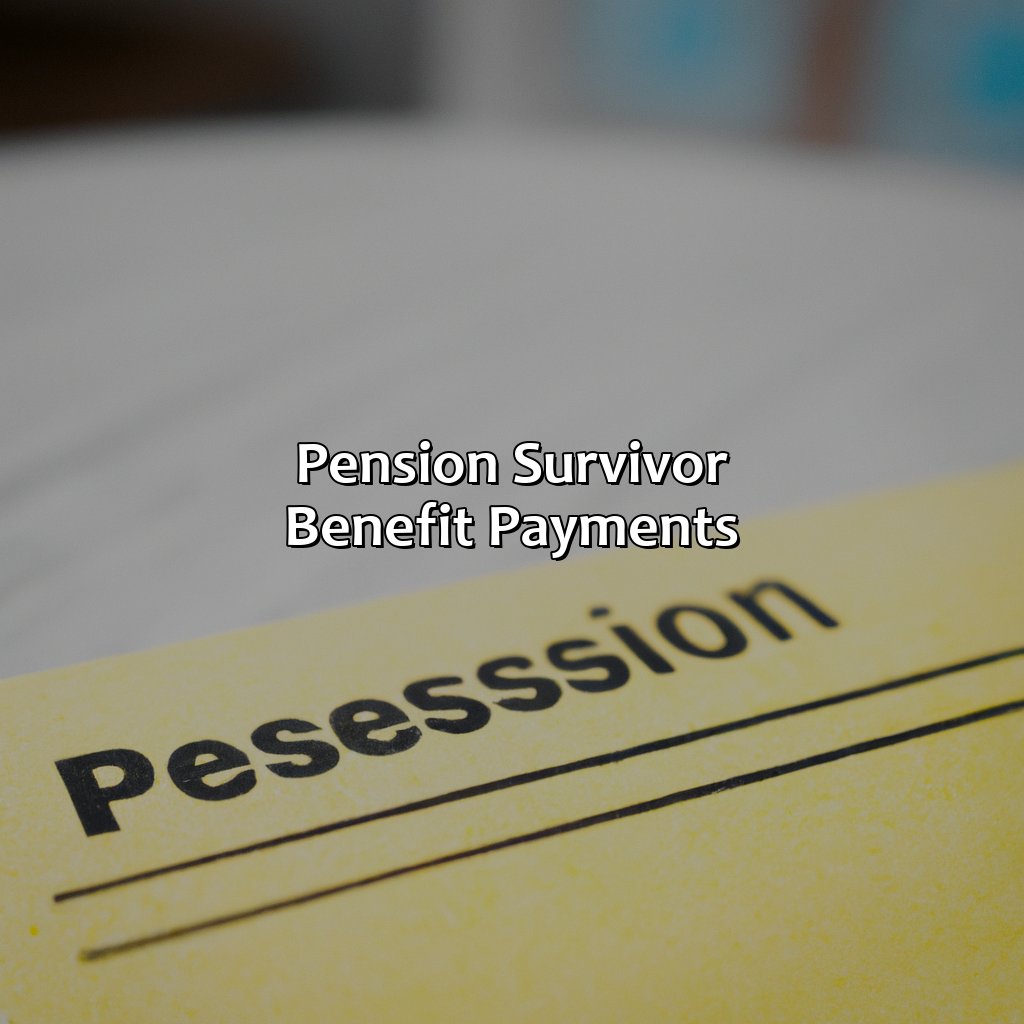
Image credits: retiregenz.com by Yuval Duncun
Pension Payment Options for Surviving Spouses
Pension benefits can also extend to spouses. Surviving Spouses have various Pension Benefits Options that they can choose. These options are subject to the pension plan and specifications.
- One-time lump-sum benefit payment
- Survivor Annuity payments for life at a reduced amount
- Continued payments as if the pensioner were alive
It is essential to analyze and consider all available options before making a decision on which one to choose. Factors such as age, length of marriage, and health are crucial points to consider.
Besides, it is also possible for a surviving spouse to receive an additional death benefit from the pension. This benefit varies depending on the military pension plan rules and policies.
A source reported that according to a study by The National Institute on Retirement Security, households with a defined benefit plan are more likely to be satisfied with their retirement plans than those without one.
Getting paid for outliving your spouse: it’s like winning the lottery, except the prize is loneliness.
Mechanics of Survivor Benefits Payment
Survivor pension benefit payments are made to the beneficiaries of an individual who has died but had previously earned a pension from their employment. These payments can be made to a surviving spouse, children, or dependents of the deceased employee. The amount and duration of the payment depend on various factors such as the type of pension plan, age and marital status of the beneficiary, and any additional benefits selected by the employee.
In some cases, survivors may be eligible for lump-sum payments. These payments can be distributed in different ways such as annual installments or one-time payouts. The mechanics behind these payments vary depending on the specific plan and company policy, so it’s important to review your plan documents carefully.
It’s essential to note that not all pensions include survivor benefits, so it is necessary to confirm with your employer about this feature before enrolling in any retirement plan. Taking the time to understand how pension plans work ensures that your loved ones remain financially secure even after you’ve passed away.
Pro Tip: Keep a copy of your pension beneficiary designation form updated regularly to ensure that your loved ones receive the survivor benefits they deserve. Learn more about how much a union carpenters pension can provide for your family.
Looks like even in death, the government still finds a way to cut your benefits.
Reduction of Survivor Benefits
Understand “Reduction of Survivor Benefits” in the pension scheme? You need to know the circumstances affecting reduction. Here’s a breakdown:
How is the reduction of benefits calculated? Read on for more info about the sub-sections.
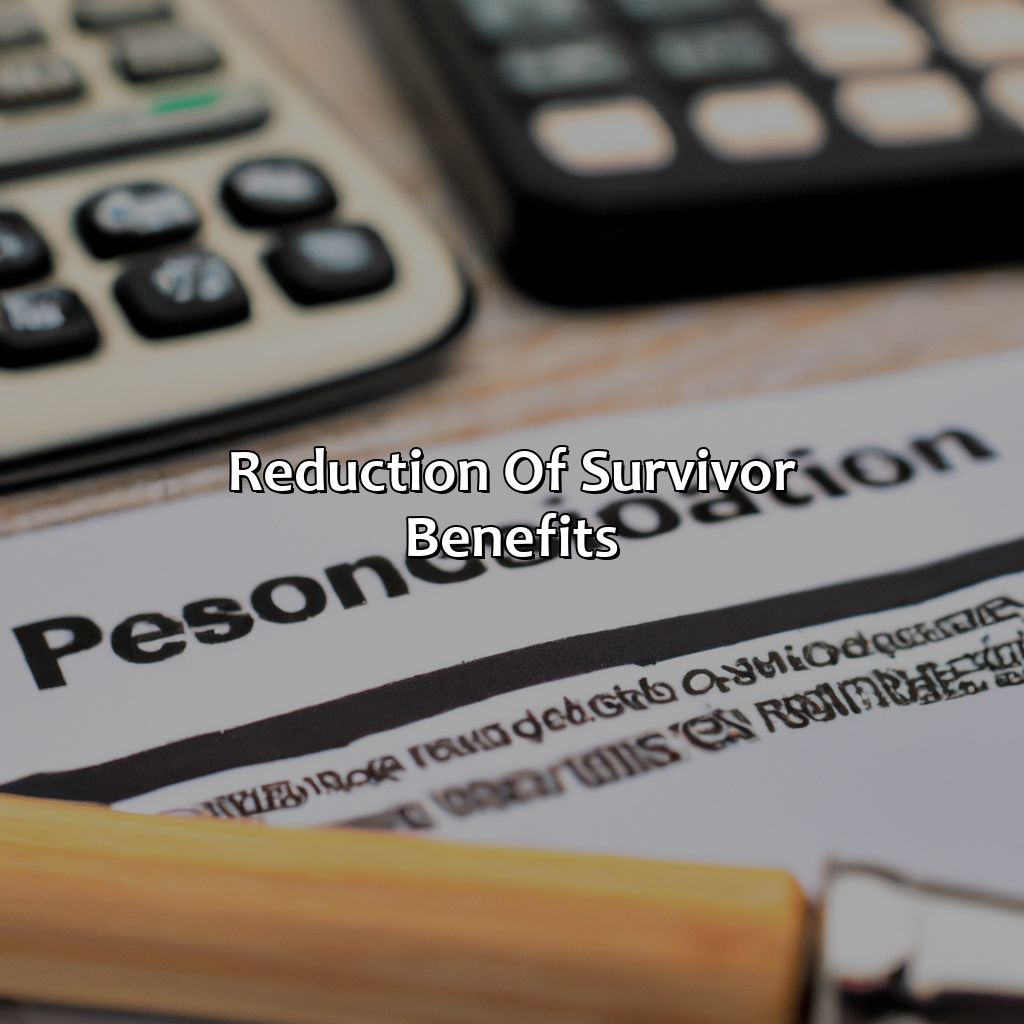
Image credits: retiregenz.com by Joel Arnold
Circumstances That Affect Benefit Reduction
The reduction of survivor benefits can occur due to a variety of factors that alter the initial benefit amount. Factors such as age differences among spouses, remarriage after the death of a spouse, or a significant earnings gap between two spouses can cause a reduction in the survivor’s benefits. The amount of reduction depends on several factors including the duration of time married and whether both parties have contributed to the pension fund equally.
In cases where there is an age disparity between spouses, a percentage reduction may occur depending on how many years apart they are in age. Similarly, if the surviving spouse remarries before turning 60 years old, they lose their claim to any survivor benefits from their previous marriage until their new marriage ends. Furthermore, if one spouse earns significantly higher wages than their partner does throughout their joint employment history and lifespan, it will result in lower monthly survivor benefits.
It is important to note that some survivors could qualify for multiple pensions based on various work histories and shared circumstances. The Windfall Elimination Provision (WEP) is introduced by Social Security Act which may lower the monthly benefit amounts collected by individuals. Until 1983, government employees were not eligible for social security retirement benefits. However, with WEP taking place now, it reduces not only what government workers receive from Social Security for themselves but also what survivors are entitled to receive after an employee dies.
Reducing survivor benefits is like getting a participation trophy for being the sole survivor of a zombie apocalypse.
How the Reduction of Benefits is Calculated
Survivor benefits reduction is commonly determined by the pension plan provider according to a formula that involves several variables, such as the beneficiary’s age, the deceased individual’s age at death, the total number of years spent working, and any other factors specified in the plan. This formula seeks to balance out the cost of maintaining survivor benefits with the pension fund’s long-term viability.
One factor that influences survivor benefit reduction is the age difference between the deceased individual and their beneficiary. A large age gap may result in a higher reduction since the surviving member is expected to live longer than someone closer in age to their partner. Furthermore, any additional earnings or assets inherited by beneficiary could also decrease their eligible state pension survivor benefits.
It should be noted that some pension plans provide certain guarantees or protections for beneficiaries with regards to reductions in survivor benefits throughout their lifetimes. Nevertheless, it is advisable to check one’s respective pension plan documents and discuss any concerns with a financial advisor.
According to Forbes, some states such as Michigan have laws allowing public employees’ domestic partners to receive full survivorship benefits if they meet certain eligibility criteria.
Who says death can’t be profitable? Maximizing pension survivor benefits may just make you the richest widow in town.
Maximizing Pension Survivor Benefits
Maximizing your pension survivor benefits requires you to understand the rules and available options. To make sound financial decisions, you must consider the benefits of each option. This section aims to assist you in understanding these concepts. It is divided into two sub-sections: “Understanding Pension Rules and Options” and “Making Sound Financial Decisions“.
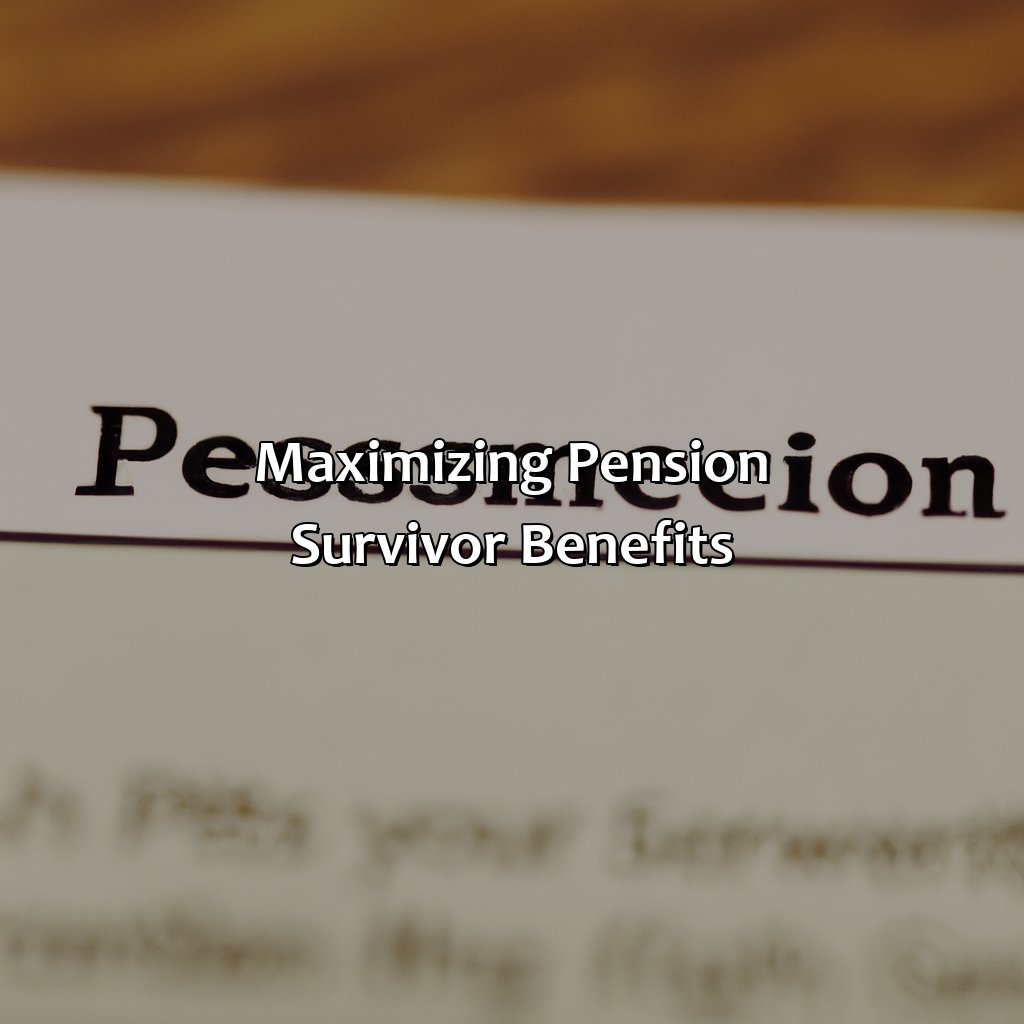
Image credits: retiregenz.com by Adam Washington
Understanding Pension Rules and Options
Pension plans offer specific rules and options that must be understood in order to make informed decisions. Knowing the ins and outs of pension survivor benefits is essential for maximizing retirement funds.
When it comes to pension survivor benefits, certain factors need to be considered like who the beneficiary will be, the amount of the benefit, and possible taxes. The process can seem daunting at first, but understanding a few key terms such as joint-and-survivor annuity option, lump-sum death benefit and qualified pre-retirement survivor annuity (QPSA) can be helpful.
It’s important to note that QPSA is only given to beneficiaries if the plan participant died before retirement. If they pass away after retiring but before receiving pension payments, their surviving spouse may receive benefits through the joint-and-survivor annuity option election or lump sum death payment.
Studies by Vanguard show that selecting a QPSA typically reduces an individual’s pension payment by 5-10 percent annually.
Remember, the only sound financial decision is to marry someone with a better pension plan than yours.
Making Sound Financial Decisions
Sound Financial Decision-Making is a critical skill to possess in today s world. It entails having proper knowledge of various investment alternatives and assessing your financial position before making any investment choices. Furthermore, by accessing viable resources, one can choose an appropriate plan that suits their goals and financial capabilities to keep them secured in the long run.
In understanding Sound Financial Decision-Making, one cannot overlook Pension Survivor Benefits. This package secures the financial future of a surviving spouse or designated beneficiary when the account holder passes away. Thus ensuring security, losing less money on taxes and making valuable contributions throughout one’s earning years are crucial.
Maximizing Pension Survivor Benefits also calls for an appropriate understanding of its working mechanics. For instance, selecting different payout arrangements will have a bearing on how the benefits are paid after death. Choosing monthly annuity payments guarantees a steady stream of income while choosing lump-sum payment provides more flexibility and control over funds.
To learn more about what is a civil service retirement pension, and how it can benefit you, consult with a retirement planning expert today.
It is worth noting that Sound Financial Decision-Making requires starting at an early age to reap maximum benefits from investment plans such as pension survivor benefits. The earlier you begin putting in place financial choices suitable for yourself or any beneficiaries in your later years, the better you’ll stand financially in times of need.
Did you know that individuals with employer-sponsored retirement plans tend to save more? According to Harvard Business Review, employees with access to these schemes save approximately 36% more than those without retirement accessibilities.
If you are wondering what is a workplace pension, it is a retirement savings plan that is sponsored by an employer. The plan helps employees save for their retirement years, with contributions from both the employer and the employee. One important aspect of a workplace pension is survivor benefits, which provide financial protection to the spouse or other beneficiaries after the death of the employee.
Five Facts About How Do Pension Survivor Benefits Work:
- ✅ Pension survivor benefits are benefits payable to the surviving spouse or partner of a deceased pension plan member. (Source: Canada.ca)
- ✅ The amount of pension survivor benefits paid out is generally a percentage of the deceased pension plan member’s pension. (Source: Investopedia)
- ✅ Some pension plans may also offer survivor benefits to dependent children or other designated beneficiaries. (Source: The Balance)
- ✅ The eligibility and calculation of survivor benefits can vary depending on the pension plan and the applicable laws and regulations. (Source: Pension Rights Center)
- ✅ It is important to understand the implications of choosing the pension survivor benefit options, such as the impact on pension income and estate planning. (Source: Betterment)
FAQs about How Do Pension Survivor Benefits Work?
How do pension survivor benefits work?
Survivor benefits are a valuable component of many pension plans. These benefits provide for a source of income if the pensioner passes away, ensuring that their spouse or other beneficiaries are taken care of. So, how do pension survivor benefits work?
Who is eligible for pension survivor benefits?
The eligibility for pension survivor benefits depends on the specific pension plan. In most cases, married partners are automatically eligible for survivor benefits. In some cases, unmarried partners may also be eligible, as well as children or other dependents.
What percentage of the pension benefit does a survivor receive?
Again, this depends on the specific pension plan. Typically, survivors receive a percentage of the pension benefit that the pensioner was receiving at the time of their death. This percentage can vary depending on a number of factors, including the length of time that the pensioner was receiving benefits, the age difference between the pensioner and their survivor, and whether or not the survivor is a spouse.
Are survivor benefits taxed?
Survivor benefits are often taxable income. The amount of tax that the survivor will pay depends on a number of factors, including the amount of the survivor s income and the state and local laws where they reside. It is important to consult with a tax professional to determine the exact amount of tax that will be owed on survivor benefits.
What happens if the pensioner dies before retirement?
If the pensioner dies before retirement, their beneficiaries may still be eligible for survivor benefits. In this case, the benefits may take the form of a lump sum payment rather than ongoing monthly payments. The amount of the lump sum payment will depend on the terms of the pension plan.
Can survivor benefits be waived?
Yes, in some cases survivor benefits can be waived. This option may be available to pensioners who would like to receive a higher monthly benefit during their lifetime, but do not wish to leave a portion of their pension to a survivor. It is important to understand the implications of waiving survivor benefits before making this decision.
